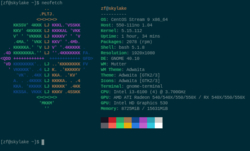Top Qs
Timeline
Chat
Perspective
Neofetch
System information shell tool From Wikipedia, the free encyclopedia
Remove ads
Neofetch is a system information tool written in the Bash shell scripting language.[2] It displays a logo of the distribution, rendered in ASCII art,[3][4] and a static display of the computer's basic hardware and software configurations and their versions. The display includes the operating system, the host (namely the technical name of the machine), uptime, package managers, the shell, display resolution, desktop environment, window manager, themes and icons, the computer terminal, CPU, GPU, and RAM. Neofetch can also display images on the terminal with w3m-img or Sixel in place of the ASCII logo art.
This article may rely excessively on sources too closely associated with the subject, potentially preventing the article from being verifiable and neutral. (July 2022) |
Neofetch development was discontinued on 26 April 2024, nearly four years after it was last updated.[5][6]
Remove ads
References
External links
Wikiwand - on
Seamless Wikipedia browsing. On steroids.
Remove ads

